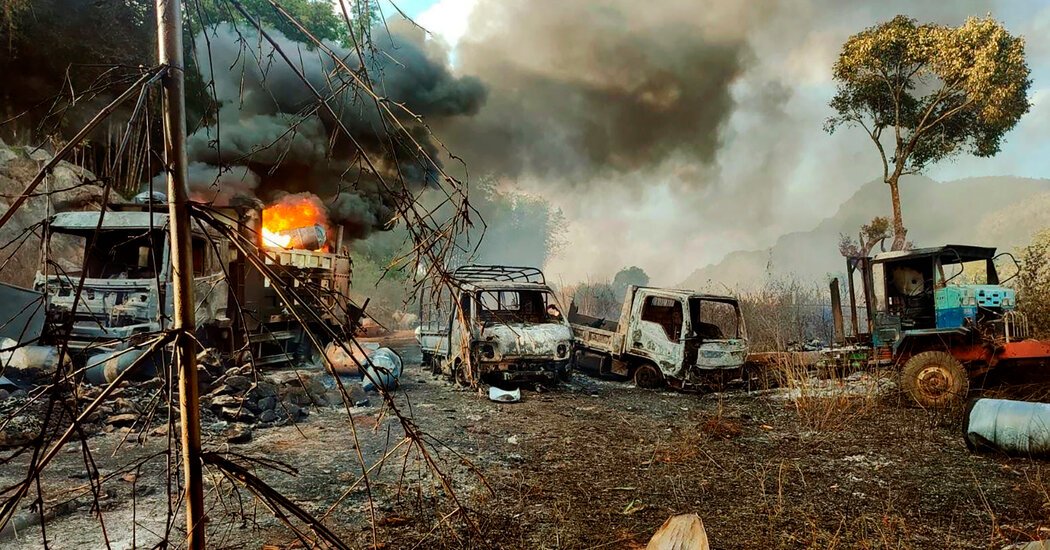Myanmar’s Army Is Accused of Massacring Dozens of Civilians – The New York Times
Advertisement
Supported by
At least 35 people were killed and their bodies burned, according to an international aid group and opponents of the military regime.
Send any friend a story
As a subscriber, you have 10 gift articles to give each month. Anyone can read what you share.
By Richard C. Paddock
An international aid group and opponents of Myanmar’s ruling military have accused soldiers of killing at least 35 villagers who were fleeing combat on Christmas Eve and of then burning their bodies. The aid group said that two of its staff members may have been among those killed.
Photographs said to have been taken at the scene, in Kayah State, show the charred remains of bodies in the back of three trucks. According to the aid group, Save the Children, a car that two of its staff members had been using to drive home for the holidays was among a dozen or so charred vehicles at the scene. The staff members are now missing, the group said.
“We are horrified at the violence carried out against innocent civilians and our staff, who are dedicated humanitarians, supporting millions of children in need across Myanmar,” Save the Children’s chief executive, Inger Ashing, said in a statement on Saturday.
The army, which ruled Myanmar for nearly half a century before granting civilian leaders some power a decade ago, seized full control again in a Feb. 1 coup and has since mounted a vicious crackdown against its opponents, some of whom have taken up arms. The army, known as the Tatmadaw, has a long history of committing atrocities against civilians.
The junta said in a statement on Friday that the vehicles found at the scene had not stopped for inspection as ordered and that some “terrorists” in the group had begun shooting at soldiers, who returned fire.
The statement did not mention the burning of any vehicles or bodies. A spokesman for the military could not be reached for comment on Sunday.
The United States Embassy in Myanmar said on Twitter that it was “appalled by this barbaric attack in Kayah state that killed at least 35 civilians, including women and children.”
“We will continue to press for accountability for the perpetrators of the ongoing campaign of violence against the people of Burma,” the embassy added, using Myanmar’s former name.
A senior United Nations official called for an immediate “thorough and transparent investigation into the incident so that perpetrators can be swiftly brought to justice.”
Martin Griffiths, the under secretary general for humanitarian affairs and the emergency relief coordinator, said on Twitter that he was “horrified” by reports of the attack. “I condemn this grievous incident and all attacks against civilians throughout the country, which are prohibited under international humanitarian law,” he said.
The killings took place about 150 miles southeast of Myanmar’s capital, Naypyidaw, near a military-controlled area of Kayah State where the Karenni ethnic group has long sought autonomy from the central government.
For decades, the military has battled intermittently with several armed Karenni groups, one of the many conflicts it has waged against ethnic militias around the country. Since the coup, the fighting in Kayah State has escalated.
Save the Children said that at least 38 people had been killed in the episode on Friday morning, which took place near the village of Moso in the Hpruso township, a Christian community. The National Unity Government, a shadow administration formed by elected officials ousted after the coup, put the number of dead at 35 to 40.
A recent military coup. Following a military coup on Feb. 1, unrest has been growing. Peaceful pro-democracy demonstrations have given way to insurgent uprisings against the Tatmadaw, the country’s military, which ousted the country’s civilian leader, Daw Aung San Suu Kyi.
Ms. Aung San Suu Kyi is a polarizing figure. The daughter of a hero of Myanmar’s independence, Ms. Aung San Suu Kyi remains very popular at home. Internationally, her reputation has been tarnished by her recent cooperation with the same military generals who ousted her.
The coup ended a short span of quasi-democracy. In 2011, the Tatmadaw implemented parliamentary elections and other reforms. Ms. Aung San Suu Kyi came to power as state councillor in 2016, becoming the country’s de facto head of government.
The coup was preceded by a contested election. In the Nov. 8 election, Ms. Aung San Suu Kyi’s party won 83 percent of the body’s available seats. The military, whose proxy party suffered a crushing defeat, refused to accept the results of the vote.
Ms. Aung San Suu Kyi faces years in prison. On Dec. 6, a court sentenced her to four years in a closed-door trial that the U.N. and foreign governments have described as politically motivated. While this initial sentence has since been reduced to two years, Ms. Aung San Suu Kyi is facing a series of rulings that could keep her locked up for the rest of her life.
According to the unity government, troops were conducting a “clearance operation” in the township, a brutal method that the military has often used to drive residents from an area, including during the 2017 campaign against Rohingya Muslims. It has been widely characterized as ethnic cleansing. In such operations, villagers are often killed indiscriminately and their homes burned.
On Friday, according to the National Unity Government, troops blocked the road outside Moso, trapped residents who were fleeing in cars and tractors, bound them and burned them alive, in what the shadow government called a “Christmas massacre.”
Four members of the junta’s border guard force, who were in the area, tried to intervene and negotiate the release of the villagers, but the soldiers shot and killed them, according to the unity government and the Karenni Nationalities Defense Force, one of the armed groups operating in Kayah State.
The border guards’ bodies were not among those burned, said Gway Ba Yar, a spokesman for the Karenni Nationalities Defense Force, who said that he had gone to the scene and whose photographs have been widely distributed. His pictures show four dead men in border guard uniforms with their hands tied behind their backs.
Ba Nya, a spokesman for the Karenni Human Rights Group, who said that he had also visited the scene, said he believed that several children, including an infant, were among those killed, based on the children’s clothing he said had been strewn on the road.
“This is a brutal war crime committed by the Myanmar military,” Mr. Ba Nya said.
The unity government, known as the N.U.G., has accused the junta of using “extreme terror tactics” against civilians. This month, it said, soldiers burned alive at least 11 people, including five children, in the Sagaing region, an area in northwestern Myanmar where many residents have mounted an armed resistance to the coup.
“As the world celebrates Christmas and its message of peace, the N.U.G. repeats its demands on the international community to act immediately and decisively to end the military junta’s escalating war crimes and crimes against humanity against the Myanmar people,” the group said.
Advertisement



